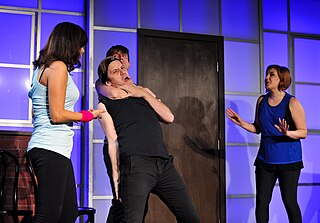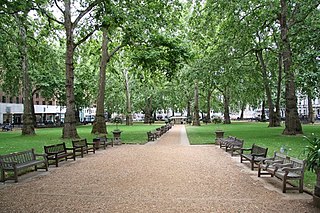Related Research Articles
Ronald Binge was a British composer and arranger of light music. He arranged many of Mantovani's most famous pieces before composing his own music, which included Elizabethan Serenade and Sailing By.

Sketch comedy comprises a series of short, amusing scenes or vignettes, called "sketches", commonly between one and ten minutes long, performed by a group of comic actors or comedians. The form developed and became popular in vaudeville, and is used widely in variety shows, comedy talk shows, and some sitcoms and children's television series. The sketches may be improvised live by the performers, developed through improvisation before public performance, or scripted and rehearsed in advance like a play. Sketch comedians routinely differentiate their work from a "skit", maintaining that a skit is a (single) dramatized joke while a sketch is a comedic exploration of a concept, character, or situation.

The Piano Concerto in A minor, Op. 16, composed by Edvard Grieg in 1868, was the only concerto Grieg completed. It is one of his most popular works and is among the most popular of the genre.

Bernard Stanley "Acker" Bilk, was an English clarinetist and vocalist known for his breathy, vibrato-rich, lower-register style, and distinctive appearance – of goatee, bowler hat and striped waistcoat.

"A Nightingale Sang in Berkeley Square" is a British romantic popular song written in 1939 and published in 1940, with lyrics by Eric Maschwitz and music by Manning Sherwin.

The Vicar of Dibley is a British sitcom which originally ran on BBC One from 10 November 1994 to 1 January 2007. It is set in a fictional small Oxfordshire village called Dibley, which is assigned a female vicar following the 1993 changes in the Church of England that permitted the ordination of women. Dawn French plays the lead role, a vicar named Geraldine Granger.

Wolfgang Amadeus Mozart's Clarinet Concerto in A major, K. 622, was completed in October 1791 for the clarinettist Anton Stadler. It consists of three movements, in a fast–slow–fast succession.
Danse macabre, Op. 40, is a tone poem for orchestra, written in 1874 by the French composer Camille Saint-Saëns. It premiered 24 January 1875. It is in the key of G minor. It started out in 1872 as an art song for voice and piano with a French text by the poet Henri Cazalis, based on the play Danza macàbra by Camillo Antona-Traversi. In 1874, the composer expanded and reworked the piece into a tone poem, replacing the vocal line with a solo violin part.
Gordon Percival Septimus Jacob CBE was an English composer and teacher. He was a professor at the Royal College of Music in London from 1924 until his retirement in 1966, and published four books and many articles about music. As a composer he was prolific: the list of his works totals more than 700, mostly compositions of his own, but a substantial minority of orchestrations and arrangements of other composers' works. Those whose music he orchestrated range from William Byrd to Edward Elgar to Noël Coward.

Franz Schubert's Symphony No. 8 in B minor, D. 759, commonly known as the Unfinished Symphony, is a musical composition that Schubert started in 1822 but left with only two movements—though he lived for another six years. A scherzo, nearly completed in piano score but with only two pages orchestrated, also survives.
Joseph Horovitz was an Austrian-born British composer and conductor best known for his 1970 pop cantata Captain Noah and his Floating Zoo, which achieved widespread popularity in schools. Horovitz also composed music for television, including the theme music for the Thames Television series Rumpole of the Bailey, and was a prolific composer of ballet, orchestral, wind band and chamber music. He considered the fifth string quartet (1969) to be his best work.
English Folk Song Suite is one of English composer Ralph Vaughan Williams' most famous works. It was first published for the military band as Folk Song Suite and its premiere was given at Kneller Hall on 4 July 1923, conducted by Lt Hector Adkins. The piece was then arranged for full orchestra in 1924 by Vaughan Williams' student Gordon Jacob and published as English Folk Song Suite. The piece was later arranged for British-style brass band in 1956 by Frank Wright and published as English Folk Songs Suite. All three versions were published by Boosey & Hawkes; note the use of three different titles for the three different versions. The suite uses the melodies of nine English folk songs, six of which were drawn from the collection made by Vaughan Williams’ friend and colleague Cecil Sharp.
A Symphony to Dante's Divine Comedy, S.109, or simply the "Dante Symphony", is a choral symphony composed by Franz Liszt. Written in the high romantic style, it is based on Dante Alighieri's journey through Hell and Purgatory, as depicted in The Divine Comedy. It was premiered in Dresden in November 1857, with Liszt conducting himself, and was unofficially dedicated to the composer's friend and future son-in-law Richard Wagner. The entire symphony takes approximately 50 minutes to perform. It premiered on 7 November 1857.

The music of the Star Wars franchise is composed and produced in conjunction with the development of the feature films, television series, and other merchandise within the epic space opera franchise created by George Lucas. The music for the primary feature films was written by John Williams. Williams' work on the series included the scores of nine feature films, a suite and several cues of thematic material for Solo and the theme music for the Galaxy's Edge Theme Park. These count among the most widely known and popular contributions to modern film music, and utilize a symphony orchestra and features an assortment of about fifty recurring musical themes to represent characters and other plot elements: one of the largest caches of themes in the history of film music.
Emma Johnson is a British clarinettist, who was appointed MBE for services to music in 1996.
Sarah Travis is a British orchestrator and musical supervisor for theatre and film. She received the Tony Award for Best Orchestrations and the Drama Desk Award for Outstanding Orchestrations for the 2005 revival of Stephen Sondheim's Sweeney Todd.
The First Suite in E♭ for Military Band, Op. 28, No. 1, by the British composer Gustav Holst is considered one of the cornerstone masterworks in the concert band repertoire. Officially premiered in 1920 at the Royal Military School of Music, the manuscript was originally completed in 1909. Along with the subsequent Second Suite in F for Military Band, written in 1911 and premiered in 1922, the First Suite convinced many other prominent composers that serious music could be written specifically for band.
The music of the American television series Twin Peaks, its 1992 prequel film Twin Peaks: Fire Walk with Me, and its 2017 revival series was composed by Angelo Badalamenti. Twin Peaks' co-creator David Lynch wrote lyrics for five songs used throughout the series—including "Falling", "The Nightingale", "Into the Night", "Just You", and "Sycamore Trees"—and three songs featured in Twin Peaks: Fire Walk with Me, including "A Real Indication", "Questions in a World of Blue" and "The Black Dog Runs at Night". Julee Cruise, who made cameo appearances in both the series and film, provided vocals for four of Lynch's and Badalamenti's collaborations, and jazz vocalist Jimmy Scott performed on "Sycamore Trees". Three of the series' actors—James Marshall, Lara Flynn Boyle, and Sheryl Lee—provided vocals for "Just You".
The Septet for clarinet, bassoon, horn, piano, violin, viola and cello is a Chamber music composition by Igor Stravinsky. It was composed between July 1952 and February 1953, and the first performance took place at Dumbarton Oaks in Washington, D.C., on 23 January 1954. The score is dedicated to the Dumbarton Oaks Research Library and Collection. It consists of three movements, the first lacking a title, and the last lacking a number in the score. The work is influenced by twelve-tone technique, especially by the Wind Quintet, Op. 26, and the Suite for septet, Op. 29, composed by Arnold Schoenberg.

Scapino is a short work for large orchestra by William Walton, described by the composer as a "comedy overture". It was commissioned by the Chicago Symphony Orchestra and was first performed in 1941. A revised version was premiered in 1950.
References
- ↑ Hyperion Records. Accessed 23 April 2014
- ↑ Geoffrey Self (2001), Light music in Britain since 1870
- ↑ "The Tarogato in Great Britain", Clarinet and saxophone, 31, 2006
- ↑ John Sant (2000), Albert W. Ketèlbey (1875-1959)